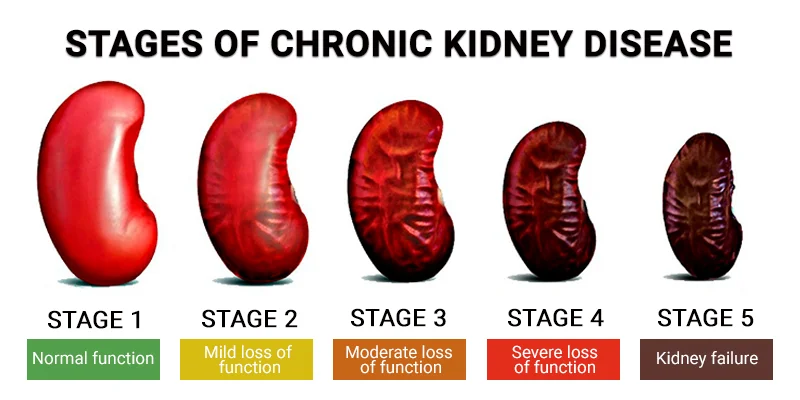Chronic Kidney Disease
Overview
Chronic Kidney Disease (CKD) is a long-term condition in which the kidneys progressively lose their ability to function effectively. Kidneys are vital organs that filter waste, toxins, and excess fluids from the blood. CKD disrupts this process, leading to the accumulation of harmful substances in the body. It is often referred to as a “silent disease” because symptoms may not appear until significant damage has occurred. CKD is a growing global health concern and is linked to increased risks of cardiovascular disease, kidney failure, and early mortality.

Key facts
- Global Prevalence: CKD affects over 800 million people worldwide, with prevalence increasing due to aging populations and rising rates of diabetes and hypertension.
- Economic Impact: CKD significantly burdens healthcare systems, particularly in the later stages requiring dialysis or kidney transplants.
- Stages of CKD: It is classified into five stages based on the Glomerular Filtration Rate (GFR):
- Stage 1: Normal kidney function but with evidence of kidney damage.
- Stage 5: End-stage renal disease (ESRD), requiring dialysis or a transplant.
- High-Risk Groups: Those with diabetes, hypertension, obesity, or a family history of kidney disease are at higher risk.
Cause of CKD
CKD has various underlying causes, including:
- Diabetes (Type 1 and Type 2): High blood sugar levels damage kidney blood vessels over time, accounting for 40-50% of CKD cases globally.
- Hypertension: Chronically high blood pressure damages the kidneys’ filtering units, making it the second most common cause.
- Chronic Glomerulonephritis: Inflammatory diseases of the kidney’s filtration system.
- Polycystic Kidney Disease (PKD): A hereditary condition causing cyst formation in the kidneys, disrupting function.
- Obstructive Nephropathy: Blockages such as kidney stones, enlarged prostate, or tumors that impair urine flow and lead to kidney damage.
- Infections and Autoimmune Diseases: Lupus nephritis and other conditions that cause immune-mediated kidney damage.
Symtoms of CKD
The progression of CKD is often asymptomatic in its early stages. However, as kidney function declines, the following symptoms may emerge:
- Early Symptoms: Fatigue, loss of appetite, and subtle changes in urine output.
- Advanced Symptoms:
- Persistent nausea and vomiting
- Swelling in the legs, ankles, and face due to fluid retention
- Shortness of breath from fluid buildup in the lungs
- Muscle cramps and itching
- Changes in urination frequency and appearance
- High blood pressure that is difficult to control
Diagnosis of CKD
Early diagnosis is crucial for slowing CKD progression. Diagnostic methods include:
- Blood Tests:
- Serum Creatinine: Used to estimate GFR and assess kidney function.
- Blood Urea Nitrogen (BUN): Measures waste levels in the blood.
- Urine Tests:
- Albumin-to-Creatinine Ratio (ACR): Detects protein in the urine, a sign of kidney damage.
- Urinalysis: Identifies abnormalities like blood or sediment.
- Imaging Tests:
- Ultrasound: Provides information on kidney size and structure.
- CT or MRI: Helps detect blockages or abnormalities.
- Kidney Biopsy: A sample of kidney tissue is analyzed to determine the specific cause of damage.
Treatment
While CKD has no definitive cure, various treatments can manage its progression and complications:
- Lifestyle Changes:
- Adopting a low-sodium, kidney-friendly diet.
- Regular physical activity.
- Avoiding smoking and limiting alcohol consumption.
- Medications:
- Blood Pressure Control: ACE inhibitors or ARBs are prescribed to lower blood pressure and protect kidney function.
- Anemia Management: Erythropoiesis-stimulating agents (ESAs) and iron supplements.
- Bone Health: Medications to manage calcium and phosphorus imbalances.
- Advanced Interventions:
- Dialysis: A lifesaving procedure for ESRD that filters waste and excess fluids from the blood.
- Kidney Transplant: The optimal treatment for ESRD, offering improved quality of life compared to dialysis.
WHO’s Stance on CKD
The World Health Organization (WHO) considers CKD a key non-communicable disease (NCD). It encourages:
- Screening Programs: Targeted testing for high-risk populations (e.g., diabetics, hypertensive individuals).
- Public Awareness Campaigns: Educating people about CKD prevention and the importance of early detection.
- Integrated Care Models: Addressing CKD alongside other chronic diseases to improve outcomes and reduce healthcare costs.




